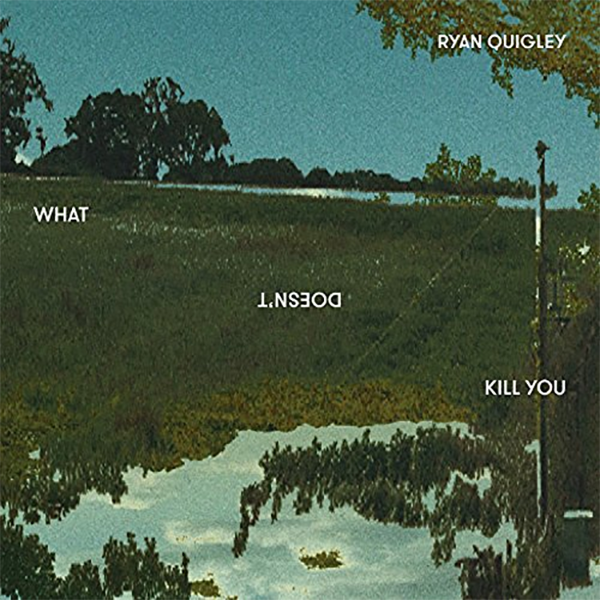
by Ian Mann
September 14, 2016
/ ALBUM
Bright, inventive and vivacious “What Doesn't Kill You” is a hugely successful and highly enjoyable updating of the hard bop tradition.
Ryan Quigley
“What Doesn’t Kill You”
(Whirlwind Recordings WR4691)
The Glasgow based trumpeter and composer Ryan Quigley is a highly versatile musician who has worked with symphony orchestras and pop acts as well as with jazz ensembles, both large and small.
Quigley has performed with such high profile names as Aretha Franklin, Tom Jones and Quincy Jones whilst simultaneously pursuing a successful jazz career and also teaching at the Royal Conservatoire of Scotland.
Quigley is perhaps best known to jazz listeners as a member of the long running reeds and brass quartet Brass Jaw but he has also worked with many other prominent Scottish jazz musicians including saxophonist Tommy Smith, bassist Euan Burton and drummer Alyn Cosker. Quigley is a member of the Scottish National Jazz Orchestra, the acclaimed national institution directed by Tommy Smith.
Quigley also leads his own small groups and even his own big band. In 2008 he released his début album “Laphroaig-ian Slip”, a blistering hard bop session that featured Cosker at the drums, Steve Hamilton at the piano and the twin sax attack of Paul Booth and Laura MacDonald.
The trumpeter’s long awaited second album features an all original programme and a stellar international line up. Joining Quigley, Booth and Hamilton are the US born, London based double bassist Michael Janisch and the great American drummer Clarence Penn. The music reflects Quigley’s love of classic hard bop but the music also has a very modern brightness and energy that gives it a highly contemporary edge. Quigley has cited the New York based trumpeter Dave Douglas (with whom Penn has also worked) as a particularly significant contemporary influence.
Presented almost as a kind of suite “What Doesn’t Kill You” begins with “Prologue”, an elegant piece of solo trumpeting with the production team enhancing Quigley’s sound with an ethereal and effective echo effect. It sounds as if the music has been recorded in a church rather than at Wincraft Studios in the Cotswolds.
“Doctor Stage” introduces the rest of the band with Hamilton’s piano leading the way and Penn providing some typically brisk and forceful drumming. The muscular sax and trumpet theme harks back to the classic Blue Note sound and there are expansive solos from Booth on big toned tenor and Quigley on strident but supremely fluent, trumpet. The horns then come together for a thrillingly molten exchange of ideas as Penn channels the spirit of Art Blakey before going on to enjoy a feature of his own.
“Fire Eyes” showcases the more impressionistic side of Quigley’s writing with its ghostly horn fanfares and susurrations, piano arpeggios, mallet rumbles and deep rich arco bass. It’s apiece that seems to owe almost as much to contemporary classical music as it does to jazz.
The title track finds the quintet simultaneously tipping its hat in the direction of 60s hard bop and 70s fusion on a piece that instantly reminded me of Freddie Hubbard. There’s some bravura trumpeting from Quigley while Hamilton rambles engagingly on Fender Rhodes. Booth’s tenor solo is something of a slow burner but ultimately reaches a satisfying level of intensity.
Janisch’s bass introduces “Green Light”, another piece illustrating the gentler side of Quigley’s writing. The attractively melodic theme is the vehicle for an expansive but profoundly lyrical piano solo from Hamilton as the horns take something of a back seat.
“The Long Journey Home” ups the energy levels again and includes an extended drum feature for the excellent Penn plus a series of fiery exchanges between Quigley on trumpet and Booth on tenor.
Credited to Janisch “Intro To Hymn To Their Homeland” is a solo bass excursion that acts as the prelude to Quigley’s “Hymn To Their Homeland”. Booth features on alto flute on an episodic piece with a strong narrative arc. Hamilton opens the solos with an imaginative, if relatively low key, outing on piano. Quigley delivers some stunning high register trumpeting on an ambitious composition that ultimately seems to represent an exaltation.
Earthier ambitions are expressed on the penultimate track “Say What You See”, a vigorous ‘blowing tune’ with robust and fiery workouts from Quigley on bright and brassy trumpet and Hamilton on churning, funky Rhodes. Booth weighs in with some appropriately muscular but fleet footed tenor as Janisch and Penn drive the whole thing along with an irrepressible energy. There’s a volcanic drum feature from the latter in the tune’s closing stages as the American ensures that he ends his contribution with a bang, both literally and metaphorically.
The album ends as it began with a solo trumpet passage, slightly longer this time and with a greater degree of variation. It’s a virtuoso performance, despite being different in character to much of the rest of the album.
“What Doesn’t Kill You” represents an excellent second solo outing from Ryan Quigley. Although rooted in the hard bop era there’s a pleasing degree of variety, both musically and emotionally, in Quigley’s writing and in the main he avoids the clichés of the hard bop idiom. Strong melodic themes are a constant throughout and the playing from a stellar cast is terrific with all of the protagonists delivering memorable solos alongside some highly commendable ensemble playing. Bright, inventive and vivacious “What Doesn’t Kill You” is a hugely successful and highly enjoyable updating of the hard bop tradition.
Quigley has just completed a short British tour playing music from the album with the leader joined by Booth, Janisch and Penn plus the acclaimed American musician Geoffrey Keezer on piano. I was disappointed at having to miss the quintet’s recent performance at Dempsey’s in Cardiff but reports have reached me from photographer Martin Healey that it was a “cracking set”. Hearing this album and given that line up I’m not surprised. Wish I’d been there.
blog comments powered by Disqus